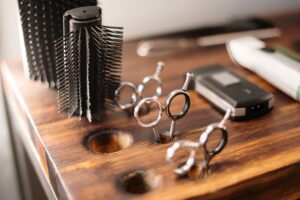Hair and Hormones

Our hair is a significant part of our identity, and its health and appearance are influenced by various factors, including our hormones. Hormonal fluctuations, which occur naturally throughout our lives, can have a profound impact on the condition of our tresses. Understanding this connection between hormones and hair is essential for maintaining luscious locks and addressing any hair-related concerns. In this blog post, we’ll explore the fascinating relationship between hormonal fluctuations and hair health, providing insights into how our hormones can affect our tresses at different stages of life.
The Role of Hormones in Hair Growth
Hormones are chemical messengers that regulate various bodily functions, including hair growth and health. The three primary hormones that play a crucial role in hair’s life cycle are estrogen, progesterone, and testosterone.
Estrogen: Known as the female hormone, estrogen promotes hair growth and keeps the hair in its growth phase for a longer time. This hormone is responsible for the lush, thick hair many women experience during their reproductive years.
Progesterone: Progesterone balances the effects of estrogen, ensuring that hair growth remains in check. It can also contribute to hair shedding during certain phases of the menstrual cycle.
Testosterone: Often thought of as a male hormone, testosterone is present in both men and women. In women, an enzyme called 5-alpha reductase can convert testosterone into dihydrotestosterone (DHT). DHT is associated with hair miniaturization, leading to hair thinning and pattern hair loss.
Understanding Hair Changes during Puberty
As hormones surge during puberty, young adolescents may experience changes in their hair. Hormones like androgens (including testosterone) play a role in the development of body hair, while sebum production increases, leading to greasier hair and potentially contributing to scalp acne. Proper hair care and hygiene are essential during this phase to manage these changes effectively.
Hormonal Influences During the Menstrual Cycle
The menstrual cycle involves a complex interplay of hormones that can impact hair health. Estrogen levels typically rise in the follicular phase, leading up to ovulation. This increased estrogen can promote thicker, shinier hair. Conversely, during the luteal phase, progesterone levels rise, and estrogen decreases. This hormonal shift may lead to scalp oiliness, hair breakage, or excessive shedding.
Pregnancy and Postpartum Hair Changes
Pregnancy brings significant hormonal changes, including elevated estrogen levels. Many women notice thicker, more voluminous hair during pregnancy, thanks to the prolonged hair growth phase. However, after giving birth, estrogen levels drop sharply, leading to postpartum hair shedding. This temporary hair loss, known as telogen effluvium, usually occurs 2-4 months after childbirth but eventually resolves as hormone levels stabilize.
Menopause and Hair Thinning
As women approach menopause, hormone levels, particularly estrogen and progesterone, decline. This hormonal shift can lead to hair thinning and increased hair sensitivity to androgens like DHT. Some women may experience pattern hair loss, particularly around the crown and temples. Maintaining a healthy diet, staying active, and using hair care products targeted for thinning hair can help manage these changes during menopause.
Addressing Hair Concerns
While we cannot control our hormones entirely, there are ways to care for our hair during hormonal fluctuations. Some tips include:
- Nourishing Hair Care: Use sulfate-free shampoos and conditioners that promote hair hydration and avoid excessive heat styling that can cause damage.
- Nutritious Diet: Consume a balanced diet rich in vitamins, minerals, and protein to support overall hair health.
- Stress Management: High stress levels can exacerbate hormonal imbalances, affecting hair health. Engage in relaxation techniques like meditation or yoga to manage stress.
- Consultation with Professionals: If experiencing significant hair concerns, seek advice from a dermatologist or trichologist to identify any underlying issues and develop an appropriate treatment plan.

Conclusion
Our hormones have a significant impact on the health and appearance of our hair at various stages of life. Understanding the relationship between hormones and hair can help us navigate hair changes with confidence and make informed decisions about our hair care routines. By embracing a holistic approach to hair care, nourishing our bodies, and seeking professional guidance when necessary, we can maintain beautiful and healthy tresses through hormonal fluctuations and beyond.

